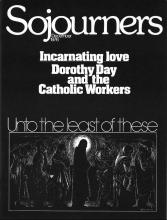He has shown strength with his arm,
he has scattered the proud in the imagination of their hearts,
he has put down the mighty from their thrones,
and exalted those of low degree;
he has filled the hungry with good things,
and the rich he has sent empty away.
(Luke 1:51-53)
The words of scripture at the top of this page are from what has come to be known as Mary's Magnificat. They are simply the words of praise and humble worship offered by a Jewish peasant girl realizing that Christ is to be born from her flesh. Mary's words speak of the social revolution at the core of the gospel, here made clear from the first moments of the incarnation.
It seems fitting to us, during the season in which we especially celebrate the incarnation, to focus our attention on another woman and the movement which she helped to spread for over forty years.
The radical character of Mary's Magnificat has been simply, but profoundly, reflected in the life of Dorothy Day and in the mission of the Catholic Worker movement. That the Lord has shown strength with his arm among the Catholic Workers is evident in the quiet spiritual determination which marks their daily activities. Through the movement's persistent public testimony against the purposes of privilege and power, the proud and the mighty have indeed been confronted and confounded.
To exalt those of low degree has been the calling that has most shaped the life of Dorothy Day and the Catholic Workers. Because of the way Workers have lived their lives, countless numbers of hungry people have been filled with good things. The poor have come to know that the Catholic Workers can be turned to for a bowl of soup, a place to stay, and a listening ear.
The rich have been sent empty away, not by harsh words, but by a style of life that confronts them with their own spiritual mediocrity.
Read the Full Article

